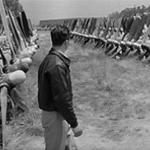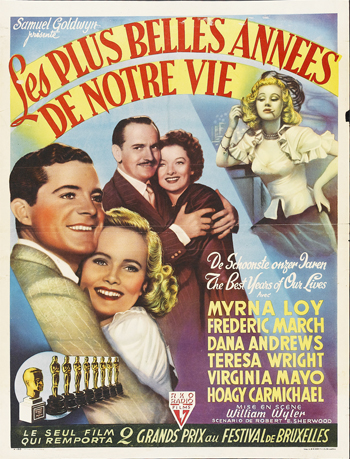 THE BEST YEARS OF OUR LIVES is the earliest movie I’ve seen about veterans coming home from war and having trouble readjusting, and very different from the other ones. If it was made after Iraq and Afghanistan it might’ve been a sun-drenched support-the-troops true tale of sacrifice like AMERICAN SNIPER. If it was after Vietnam it might’ve been a dark but entertaining genre tale, like ROLLING THUNDER or FIRST BLOOD. But this was 1946, right after World War II, so it’s a beautiful black and white ensemble drama directed by William Wyler (BEN-HUR) and shot by Gregg Toland (CITIZEN KANE).
THE BEST YEARS OF OUR LIVES is the earliest movie I’ve seen about veterans coming home from war and having trouble readjusting, and very different from the other ones. If it was made after Iraq and Afghanistan it might’ve been a sun-drenched support-the-troops true tale of sacrifice like AMERICAN SNIPER. If it was after Vietnam it might’ve been a dark but entertaining genre tale, like ROLLING THUNDER or FIRST BLOOD. But this was 1946, right after World War II, so it’s a beautiful black and white ensemble drama directed by William Wyler (BEN-HUR) and shot by Gregg Toland (CITIZEN KANE).
It’s the story of three men fresh back from the war. Army captain and bombardier Fred Derry (Dana Andrews, GOOD GUYS WEAR BLACK) can’t get a flight back to his home town of Boone City, but a woman at the airline desk points him to where he can catch a ride on an army plane. He has to wait around for hours, but ends up in the nose of a bomber with sailor Homer Parrish (Harold Russell, INSIDE MOVES) and infantry sergeant Al Stephenson (Fredric March, …TICK …TICK …TICK). They marvel over the view of America and bond over what they did in the war, and who and what they’re coming back to.
They get home and we follow each of them as they return to their families, try to find jobs, try to make regular life work again. For the most part their loved ones are thrilled to have them back, and will do anything they can to support them. And many people see their medals and treat them as heroes. Al is welcomed back at the bank where he worked, to almost an uncomfortable “we want to show off that we have a veteran on staff” level. Fred not as much. The drugstore has been taken over by a chain who will only hire him back as assistant to his old assistant when he was a soda jerk.
They never say it, but we can see on their faces that nobody understands them. They’re constantly running into people who are shameless about their distance from the sacrifices of war. Fred can’t get on a flight, but some asshole with a black servant to carry his luggage comes after him and gets on because his secretary called ahead. Some dick at the soda counter wants to lecture Homer about the pointlessness of the war, because he read an article about it. Fred’s wife wants him to just get over the war. But also she wants him to wear his uniform when they go out. “Now you look like yourself.” He looks so sad when she says that.
This is a nearly 3-hour movie, but it’s not an epic. It’s intimate. It’s about each of them resolving their put-on-hold relationships. For Al and Homer it’s about learning to let their wife of 20 years (Myrna Loy, BEN-HUR) and girlfriend since childhood (Cathy O’Donnell, BEN-HUR) back into their emotional lives. For Fred it’s about realizing he doesn’t fit with his married-right-before-shipping-out wife (Virginia Mayo, WHITE HEAT) and figuring out what to do about his attraction to Al’s adorable, witty, adult daughter Peggy (Teresa Wright, MRS. MINIVER), who he first meets by drunkenly hitting on.
 It’s about all that, and that’s great, but my favorite part of the movie is the first hour or so, which takes place over just a few days as the three of them first come home. It has the feeling of a hangout movie, where you’re just spending time with these guys and enjoying it. They have their time forming a friendship in the plane and in a car from the airport, and though they say they’re excited to be home they are clearly afraid to face it. When Homer gets to his house, knowing that his parents are inside, wondering if his girlfriend Wilma who lives next door is home, he suddenly tries to convince them they should all go get a drink together first. And Alan tries the same trick.
It’s about all that, and that’s great, but my favorite part of the movie is the first hour or so, which takes place over just a few days as the three of them first come home. It has the feeling of a hangout movie, where you’re just spending time with these guys and enjoying it. They have their time forming a friendship in the plane and in a car from the airport, and though they say they’re excited to be home they are clearly afraid to face it. When Homer gets to his house, knowing that his parents are inside, wondering if his girlfriend Wilma who lives next door is home, he suddenly tries to convince them they should all go get a drink together first. And Alan tries the same trick.
They’re reunited with their people and they’re happy but they are not comfortable. Watching Alan in his nice home, sitting in the living room with his nice wife, joking around with their great daughter, you get this sense that he’s been dropped out of a war zone right into a show that would be on Nick at Nite. He’s smiling and quipping but he’s itching to get out of there. And it feels sad to see him there, confined. You want him to be back to that feeling of hanging out with those guys who he’d never met before but who knew exactly where he’d been.
Suddenly he convinces wife and daughter to go out for a night on the town with him to celebrate. In montage they are able to attend a surprising number of lively spots with impressive live musicians, and he keeps drinking way past when he should’ve stopped. He’s clearly making them uncomfortable but they stick with him because hey, he’s back after years at war. Give him this. We can stay out too late and put up with this this time.
And they end up at this little place for “one last drink, I swear” and suddenly who should walk in but both Homer (he already mentioned it was his favorite local spot and that his uncle owns the place) and Fred (he’s trying to find his wife, who he’s been told works at some night club). And Alan lights up, like this is the best reunion of the day. He shouts in delight and puts his arms around them and excitedly introduces them to his family. Millie and Peggy definitely have an “oh geez, I thought we were almost ready to leave” look to them, but again, they’re willing to hang. And it’s fun hanging with them. Alan has a mix of I’m-worried-about-him level of intoxication and I-just-can’t-be-disgusted-with-him charisma. And Homer’s uncle Butch is played by Hoagy Carmichael, the famous bandleader and songwriter who wrote “Georgia On My Mind,” among other things. So he’s playing piano there, that makes it a pretty good bar.
(There’s a scene later where he and Homer play “Chopsticks” together. And that’s kind funny because “Chopsticks” and “Heart and Soul” are the two cliche songs for beginning piano students to learn – and Carmichael actually wrote “Heart and Soul”!)
Late at night, when Fred is too drunk to find his way home, the Stephensons take care of him at their house, so this night of fun continues into the hungover next day. It has a very authentic feeling of being out too late and getting too drunk and it being worth it for the company.
This is a three and a half hour movie, but it’s not an epic, it takes place maybe over a few months total. It’s very intimate, but takes its time getting into these relationships. Even the ones that get less screen time are very moving. I was interested in how much Fred clearly doesn’t want to be around his parents, who seem very nice but are lower class than everyone else we see in the movie and live in a small place. They seem very proud of him but don’t know how to connect with him. He just stops by for a minute and takes off.
I have not even really gotten into the best and most unique aspect of the movie, which is the fact that Homer is played by an untrained actor and actual war veteran who is a double amputee. He always wants to prove that he’s self-sufficient, likes to light his own (or other people’s) cigarettes, and even play a little piano. It’s kind of amazing to see him do it and makes it very powerful because even more than struggling with the helplessness that he can fall into when he has to take off his hands, he has to deal with how people look at him with horror or pity. Or his assumptions that they will, even if they don’t. You can imagine them doing this story with an actor faking the injury and it could be very emotional, but the authenticity of the more unusual way they chose to do it goes a long way.
Russell was given an honorary Oscar for “Special Award for Best Non-Professional Acting,” which turned out to be unnecessary because he also won the actual Best Supporting Actor Oscar.
Obviously styles have changed in 70 years, and this looks like an old timey Hollywood confection, but it was very natural and realistic for its time. That’s not just because one of the leads is a non-actor with a non-Hollywood face. Wyler had the actors buy their own clothes so they would look like people, not actors with backlot costumers. He had the men not made up and the women only wearing the makeup they normally wear. He insisted on hiring WWII veterans for much of the crew, which must have had the extra benefit of putting some pressure on the actors to get it right.
Producer Samuel Goldwyn hired MacKinlay Kantor, a war correspondent who had flown on bombing missions and been present during the liberation of the Buchenwald concentration camp, and would soon write the Joseph H. Lewis movie GUN CRAZY, to write a treatment. His work became a novella called Glory for Me, which was adapted by World War I veteran and Pulitzer Prize winning playwright Robert E. Sherwood (REBECCA, ABE LINCOLN IN ILLINOIS, THE BISHOP’S WIFE).
And their work did not go unnoticed. It won nine Oscars including best picture, and has held up longer than I imagine some of the newer best picture winners will. I don’t know, I haven’t revisited CRASH. But the in my opinion THE BEST YEARS OF OUR LIVES is probly better.


























September 20th, 2016 at 9:48 am
One of the great American movies. I remember being a little flabbergasted when the guy who was against the war started telling them about the war’s pointlessness. We always think of WW2 as “the one good war” but even then there were protesters.